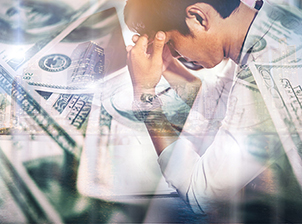Are you having trouble paying your bills?
Many people fall behind on their bills at some point in their lives. Don’t worry—you won’t go to jail. Owing money is not a crime.
We created this online guide to help you learn about the bankruptcy process and what your options may be if you’re having a hard time paying your debts.
You might think bankruptcy is the answer to your problems, but it may not be. Bankruptcy is a good choice for some people, but it is not for everyone.

First, let’s figure out what types of debt you have.
Here are some debts that cannot be eliminated by Chapter 7 bankruptcy. That means that if you file for bankruptcy, you will still have to pay these debts:
- Child support, alimony, taxes
- Federally insured student loans and most private student loans
- Secured debts (like a mortgage or car loan)
- Drunk driving fines, criminal fines, traffic tickets
If you don’t have any of these debts, you can skip to the next section to see about debts that can be eliminated by bankruptcy.
Or click on each type of debt below to get more information about how you can handle these debts.
More About Debts that Cannot be Eliminated by Chapter 7 Bankruptcy:
Alimony
Alimony is not dischargeable by Chapter 7 Bankruptcy. In this case, you may want to contact a private attorney.
Contact a Private Attorney
Most of our legal services are available only for people with very low income. If legal aid can’t help, you may want to talk to a private attorney about your legal problem. A lawyer referral service can match you up with an attorney for a small fee. Contact the lawyer referral service office in the county where you are having a legal problem. For more information: Connecticut Bar Association – Find a Lawyer.
Car Loans
- What should I do if I can’t make my car payments? (consumerfinance.gov)
- Debt Collection: Know Your Rights (Article)
Child Support
Child support debt cannot be discharged by bankruptcy.
Here are some articles on CTLawHelp.org that might be helpful to you if you need help with child support.
- How to Change Your Child Support Order (Article)
If you believe that your child support order is too low or too high, this article may help. You can get help from the state Child Support Program or do it on your own. - Questions and Answers about Child Support (Article)
Child support is usually paid until the child graduates from high school or turns 19, whichever happens first.
Drunk Driving Fines, Criminal Fines, Traffic Tickets
Debt from drunk driving fines, criminal fines, and traffic tickets is not dischargeable by Chapter 7 Bankruptcy. In this case, you may want to contact a private attorney.
Contact a Private Attorney
Most of our legal services are available only for people with very low income. If legal aid can’t help, you may want to talk to a private attorney about your legal problem. A lawyer referral service can match you up with an attorney for a small fee. Contact the lawyer referral service office in the county where you are having a legal problem. For more information: Connecticut Bar Association – Find a Lawyer.
Mortgage Debt
Are you having trouble paying your mortgage? Here are some resources that may be helpful.
- Foreclosure: Your Rights and Options (Article)
- Connecticut Fair Housing Center
- Debt Collection: Know Your Rights (Article)
- Help for Homeowners and Renters (CT State Dept. of Banking)
Rent
Are you having trouble paying rent? Here are some resources that may be helpful.
- EvictionHelpCT.org (Find out if a free lawyer is available where you live.)
- Are you Facing Eviction? (Article)
- Help if You Are Homeless or You Have Low or No Income (Article)
Student Loans
- Federal Student Aid (US Dept. of Education)
- Federal Student Loan Debt Relief (studentaid.gov)
- Student Loan Forgiveness (studentaid.gov)
Taxes
Tax debt is not dischargeable by Chapter 7 Bankruptcy.
Contact a Private Attorney
Most of our legal services are available only for people with very low income. If legal aid can’t help, you may want to talk to a private attorney about your legal problem. A lawyer referral service can match you up with an attorney for a small fee. Contact the lawyer referral service office in the county where you are having a legal problem. For more information: Connecticut Bar Association – Find a Lawyer.
Debts that CAN be eliminated by Chapter 7 bankruptcy
Now let’s look at debt that can be eliminated by bankruptcy.
You may want to explore bankruptcy as an option if you are having trouble paying any of these debts:
- Credit card bills
- Medical bills
- Utility bills
- Personal loans
Remember: Bankruptcy isn’t the best choice for everyone, even if you have some of these kinds of debts. And bills such as medical and utility bills that you get after filing bankruptcy will need to be paid.